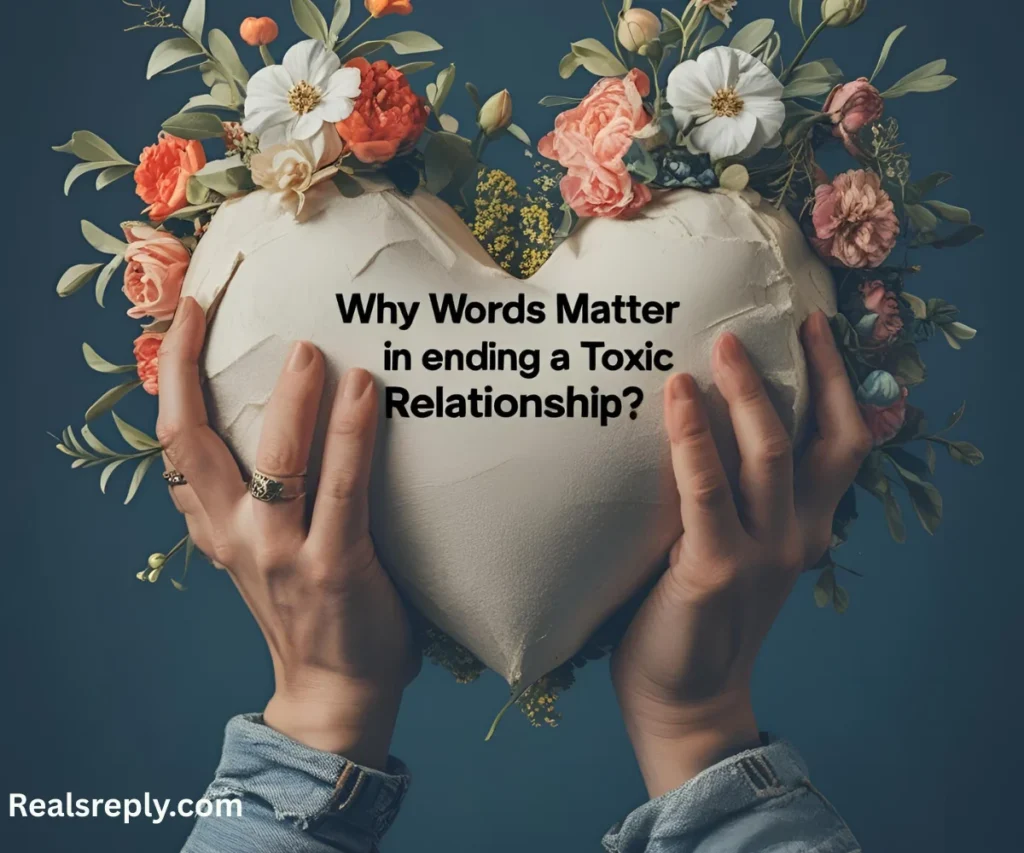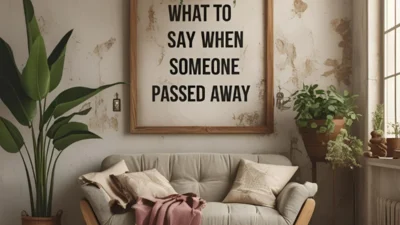Ending a toxic relationship is tough. It’s like walking away from a storm that’s been tearing you apart inside.
You might feel scared, guilty, or even unsure if you’re doing the right thing.
But choosing yourself is brave, and knowing what to say when ending a toxic relationship can make the process clearer and less painful.
This moment is about reclaiming your peace and setting boundaries for a healthier future.
Whether it’s a romantic partner, friend, or family member, the words you choose matter.
They can help you stay firm, kind, and true to yourself. In this article, we’ll guide you through practical ways to express yourself with confidence, share real-life examples, and offer scripts to help you navigate this tough conversation.
You deserve to feel safe and respected, and we’re here to help you find the right words to make that happen.
Why Words Matter in Ending a Toxic Relationship

The words you choose when ending a toxic relationship set the tone for closure. Toxic relationships often involve manipulation, guilt, or emotional chaos, so clear, calm communication helps you stay in control.
Saying the right thing can prevent arguments and keep your boundaries strong.
For example, imagine Sarah, who’s been in a draining friendship. Her friend constantly criticizes her, leaving her feeling worthless.
Sarah decides to end it but wants to avoid a fight. She says, “I need to focus on my well-being, so I’m stepping back from our friendship.” This is direct, kind, and firm. Compare that to saying, “You’re always so mean!” which might spark defensiveness.
What to say: “I’ve realized I need to prioritize my mental health, and I can’t continue this relationship.”
What not to say: “You’re the problem, and I’m done with you.”
Being clear and kind protects your peace while reducing conflict. It’s about stating your needs without attacking, which helps you walk away with dignity.
How to Prepare for the Conversation

Before you end a toxic relationship, preparation is key. Think about your reasons for leaving and practice what you’ll say. This helps you stay calm and avoid getting pulled into drama. Write down your thoughts or talk to a trusted friend to gain clarity.
Consider Jake, who’s ending a toxic romantic relationship. His partner often dismisses his feelings, making him feel invisible. Jake rehearses a script: “I need a relationship where I feel valued, and I don’t feel that here, so I’m moving on.” He also plans to say this in a neutral setting, like a coffee shop, to avoid escalation.
What to say: “I’ve thought about this, and I need to end our relationship to focus on my happiness.”
What not to say: “I can’t stand you anymore, so I’m out.”
Preparation keeps you grounded. It’s like having a map for a tough journey—you’ll feel more confident and less likely to stumble.
Setting Boundaries with Confidence
Toxic relationships often blur boundaries, so ending one means being clear about what you’ll no longer tolerate. Boundaries show you respect yourself and expect respect in return. They also prevent the other person from manipulating you back into the relationship.
Take Mia, who’s cutting ties with a controlling family member. She says, “I’m choosing to distance myself because I need space to grow. Please don’t contact me.” This sets a clear line while staying respectful. If they push back, Mia calmly repeats her boundary.
What to say: “I’m stepping away from this relationship for my well-being. I won’t be responding to messages.”
What not to say: “Leave me alone, or I’ll block you!”
Being firm but kind reinforces your decision. It’s like locking a door to protect your peace—you’re not being mean; you’re being clear.
Handling Pushback or Guilt Trips
Toxic people often react with guilt trips or anger when you try to leave. They might say, “You’re abandoning me!” or “After all I’ve done for you?” Staying calm and sticking to your script helps you avoid getting sucked back in.
For instance, Alex is ending a toxic work friendship. His colleague tries to guilt him, saying, “I thought we were close!” Alex responds, “I value our time together, but I need to focus on what’s healthy for me.” He doesn’t argue or justify—he just repeats his point calmly.
What to say: “I hear you, but my decision is final. I need to do what’s best for me.”
What not to say: “You’re making this harder than it needs to be!”
Staying steady shows you’re serious. Think of it like steering a boat through rough waters—keep your eyes on your destination, not the waves.
When to Walk Away Without Explanation
Sometimes, explaining yourself to a toxic person isn’t safe or helpful. If they’re abusive or refuse to listen, a short, clear statement—or no words at all—might be best. Your safety and peace come first.
Consider Emma, whose ex-partner was emotionally abusive. Instead of a long talk, she sends a text: “This relationship is over. Please don’t contact me.” Then, she blocks their number. This protects her from manipulation while ending things clearly.
What to say: “I’m ending this relationship and won’t be in touch anymore.”
What not to say: “Let’s talk about why this isn’t working.”
Walking away without explanation is okay when it keeps you safe. It’s like closing a book that’s too painful to keep reading—you don’t owe anyone a summary.
Supporting Yourself After the Conversation
Ending a toxic relationship doesn’t end with the conversation. You might feel relief, sadness, or even doubt. Surround yourself with supportive people, journal your feelings, or seek a therapist to process the experience. Self-care helps you heal and move forward.
For example, Liam ends a toxic friendship and feels guilty afterward. He talks to a counselor and writes down why he left, reminding himself he made the right choice. He also joins a hobby group to build new, healthy connections.
What to say to yourself: “I chose myself, and that’s a step toward a happier life.”
What not to say: “Maybe I should’ve tried harder to make it work.”
Taking care of yourself is like planting a new seed—it takes time, but it grows into something beautiful.
Conclusion
Knowing what to say when ending a toxic relationship is about finding words that honor your worth and protect your peace.
Whether you’re setting boundaries, handling pushback, or choosing to walk away silently, your words can empower you to close a painful chapter.
It’s okay to feel nervous or sad, but remember: you’re taking a brave step toward a healthier life.
Practice your words, stay calm, and lean on support systems to heal. You deserve relationships that lift you up, not tear you down.
With the right approach, you can end a toxic relationship with clarity and confidence, opening the door to brighter days.




